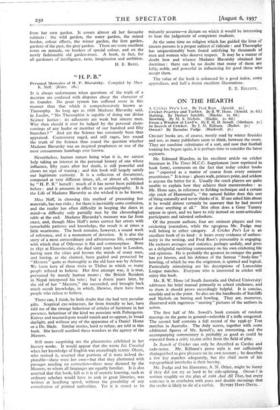" H. P. B."
Personal Memoirs of H. P. Blavatsky. Compiled by Mary K. Neff. (Rider. x 8s.)
IT is always unfortunate when questions of the truth of a doctrine are confused with disputes about the character of its founder. No great system has suffered more in this manner than that which is comprehensively known as Theosophy. So long ago as 1888 Madame Blavatsky said, in Lucifer, " No Theosophist is capable of doing our divine Science justice : its adherents are weak but sincere men. Why then should it ever be judged by the personal short- comings of any leader or member of our hundred and fifty branches ? " And yet the Science has constantly been thus appraised. Controversy raged, and still rages, less round the truth of the Science than round the question whether Madame Blavatsky was an inspired prophetess or one of the most consummate humbugs ever known.
Nevertheless, human nature being what it is, we cannot help taking an interest in the personal history of one whose influence, fifty years after her death, is still powerful and shows no sign of waning ; and this book will largely satisfy our legitimate curiosity. It is a collection of documents, composed at very different times, all, or almost all, written by " H. P. B." herself : much of it has never been published before : and it amounts in effect to an autobiography. It is the Life of Madame Blavatsky as she wished it to be known.
Miss Neff, in choosing this method of presenting her materials, has run risks ; for there is inevitably some confusion, and the reader has often difficulty in keeping the dates in mind—a difficulty only partially met by the chronological table at the end. Madame Blavatsky's memory was far from exact, and, though Miss Neff's notes correct her errors with remarkable patience and knowledge, the result is at times a little wearisome. The book remains, however, a sound work of reference, and is a monument of devotion. It is also the story of a most extraordinary and adventurous life, compared with which that of Odysseus is flat and commonplace. Born in 1831 at Ekaterinoslav, she died sixty years later in London, having seen the cities and known the minds of many men, and having, as she claimed, been guided and protected by "Masters" quite as thoroughly as the old hero was by Athene. We learn here of those visits to Thibet in which so many people refused to believe. Her first attempt was, it is true, prevented by merely human means ; " the British Resident in Nepal interposed his veto; but a dozen' years later, by the aid of her " Masters," she succeeded, and brought back much occult knowledge, in which, likewise, there have been people who refuse to believe.
There can, I think, be little doubt that she had very peculiar gifts. Sceptical eye-witnesses, far from friendly to her, have told me of the strange behaviour of articles of furniture in her presence, behaviour of the kind we associate with Poltergeists. Knives and mustard-pots would vanish and re-appear, in broad daylight, and without any of the apparatus of a Daniel Home or a Dr. Slade. Similar stories, hard to refute, are told in this book. She herself ascribed these wonders to the agency of the Masters.
Still more surprising are the phenomena exhibited in her literary works. It would appear that she wrote Isis Unveiled when her knowledge of English was exceedingly scanty. Olcott, who revised it, asserted that portions of it were indeed de- plorable—these were her own—but that they alternated with passages needing no correction—these were dictated by the Masters, to whom all languages are equally familiar. It is also asserted that this book, full as it is of esoteric learning, such as ordinary scholars would have to seek in great libraries, was written at headlong speed, without the possibility of any consultation of printed authorities. Yet it is stated to be - - minutely accurate—a dictum on which it would be interesting to hear the judgement of competent students.
At the same time no religion which has guided the lives of sincere persons is a proper subject of ridicule : and Theosophy has unquestionably been found satisfying by thousands of men and women who deserve respect. It may be a matter of doubt how and whence Madame Blavatsky obtained her doctrines : there can be no doubt that many of them are lofty, noble, and powerful in influencing for good those MI6 accept them.
The value of the book is enhanced by a good index, some appendices, and half a dozen excellent illustrations.
E. E. KsttErr.






































 Previous page
Previous page